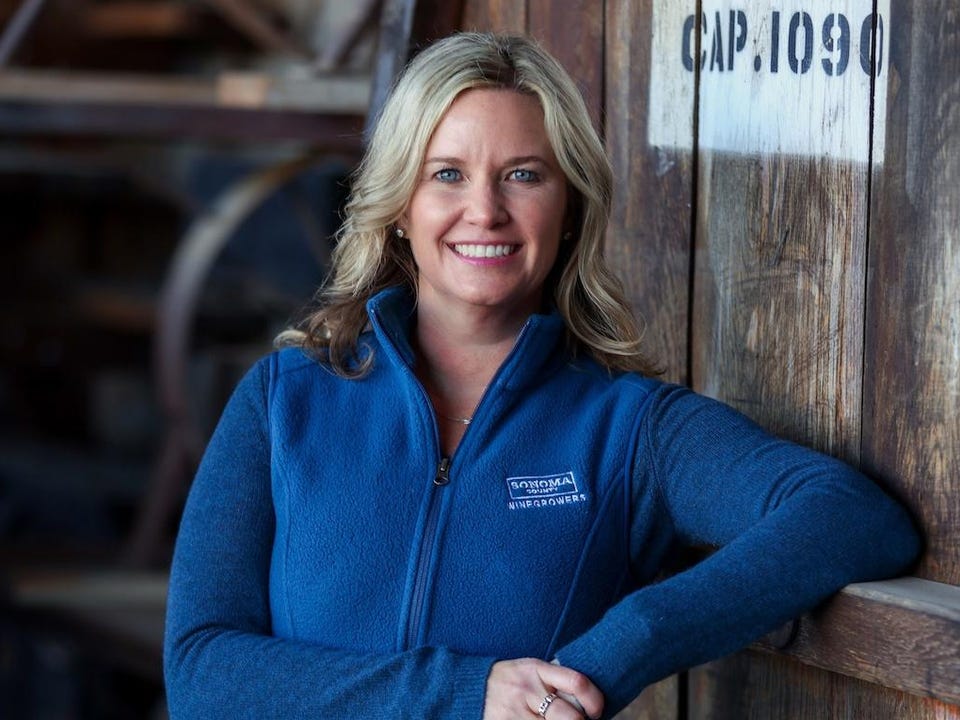Featured in Forbes: How Sonoma County Winegrowers Partnered With Ford Towards Creating The Sustainable “Farm Of The Future”
It takes a lot of a chutzpah to cold call Ford Motor Company and ask them to be your sustainability partner. But Karissa Kruse, President of Sonoma County Winegrowers, and affectionately known as the ‘Queen of Sustainability’, has never been known for timidness.
In 2014, supported by her team, she challenged the 1800 winegrowers of Sonoma County, farming 60,000 acres with grapes sold to 425 Sonoma County wineries, to become 100% certified sustainable by 2019. Certification meant that the growers had to pass a series of third-party audits to prove that they were farming their land according to environmentally and socially friendly standards, such as water conservation, energy efficiency, eliminating and/or decreasing the use of agrochemicals, and adopting best practices in employee and community relations. When the end of 2019 rolled around, a surprising 99% of the grape growers in Sonoma County had become certified sustainable, from a starting point of only 33% in 2014. “There are always a few last hold outs,” quips Kruse.
Not content to rest on their laurels, in January of 2020, Kruse and her team embarked on another initiative towards a Climate Adaptation Certification program for local winegrowers. Starting as a pilot program in 17 vineyards, the goal is to determine best practices to reduce greenhouse gas emissions. A part of this includes adoption of electric trucks, tractors and other farming equipment needed in the vineyards.
“When Ford announced they would be introducing a new electric truck,” states Kruse, “we decided to reach out to them. However, we didn’t know anyone who worked there, so we decided to cold call them. It took a while, but eventually we found the right person to pitch our sustainability partnership for the ‘Farm of the Future,’ initiative. Now we are so proud to have Ford as our partner.”
Karissa Kruse, President of Sonoma County Winegrowers
SONOMA COUNTY WINEGROWERS
Ford Pro’s New Electric Trucks, Vans, and Telematics Promote Sustainability and Efficiency
Within a short time, Ford sent a team of experts to Sonoma County to meet with the winegrowers and create a plan to introduce the new F-150 Lightning electric truck, their E-Transit cargo van, charging stations and Ford Pro E-Telematics software to pilot farms.
According to Ryan Southwick, Ford’s West Region Technology Manager,” The Telematics system can be installed under the steering wheel of gas powered vehicles so the growers can begin to track their emissions. It is already integrated into our new electric trucks and vans.”
As part of the program, Sonoma County Winegrowers has committed to purchasing the E-Telematics system for all 1800 growers, and Ford will provide an E-Transit van and F-150 Lightening electric truck to three pilot farms – Vino Farms, Dutton Ranch, and Bevill Vineyard Management – representing 4000 vineyard acres in the Russian River AVA.
Last week Ford demoed the new F-150 Lightening electric truck at the First Healdsburg Food & Wine Festival. Consumers and farmers alike were allowed to climb inside the powerful truck, while others signed up to test drive it – surprised by the roomy and comfortable front and back seats in the extended cab.
According to Elizabeth Kraft, Communications Manager with Ford Pro North America, “F-150 Lightning has the most torque out of any F-150 ever!” It has more hauling power than even the largest gas-powered Ford 150, with battery power of 230 miles for the standard-range battery and 320 for the extended range. The entry-level price point is $39,974 MSRP.
The electric trucks and vans are expected to arrive at the Sonoma County pilot farms this summer. However, the electric truck has received such overwhelming acceptance in the U.S. that it has pre-sold all of 2022 production, and the company is taking orders for 2023 delivery.
Positive Sustainability Results Already with Ford Pro for Sonoma County Vino Farms
Even at this early stage of the pilot program there have already been some positive results with the Telematics software that has been installed in gas-powered farm trucks. According to Marissa Ledbetter, VP of Operations at Vino Farms, “We have over 50 vehicles on Ford Pro Telematics and have already identified insights that are improving our bottom line like long idle times costing us an estimated $24,000 per year in wasted gas.” She continues, “We expect those benefits to grow as electric vehicles and charging stations become a more regular part of our operations.”
Marissa Ledbetter, VP of Operations at Vino Farms in Sonoma County, with Ford Pro E-Telematics … [+]
FORD PRO
The addition of electric vehicles to farming operations will contribute to a reduction in greenhouse gas emissions for the wine industry. According to a 2021 Italian wine study, fossil fuels used in the vineyard contribute to 8% of wine’s carbon footprint. Indeed winegrowers use trucks and tractors for many of their operations, including hauling fertilizer, water, and portable bathrooms for trucks, along with sustainable sprays for the vineyards. Some vineyard farm vehicles log upward of 50,000 miles a year in Sonoma County.
“Ford Pro is excited to be working together with Sonoma County winegrowers to reduce carbon emissions,” states Southwick. “Together we can be more effective and efficient.”
Kruse adds, “This collaboration with the Ford Pro team is a great natural next step to help us continue our progress in sustainable agriculture. A lot of farming families have a rich history with Ford, and with history comes trust…..that trust is critical when it comes to investing in electric vehicles….Our farmers love this pilot program; it’s going to be foundational.”
Along with many other commendable companies, Ford has set goals to reduce CO2 emissions. It plans to target 100% renewable energy for its global operations by 2035 and be fully carbon neutral worldwide by 2050.
In the meantime, Karissa Kruse and her team at the Sonoma County Winegrowers continues to take a leadership role in sustainability and creating the “Farm of the Future,” that will not only help lower greenhouse gas emissions, but will also play a key role in sequestering carbon. Indeed, this also supports the original mission of Sonoma County Winegrowers: ‘to increase the value of Sonoma County winegrapes and to nurture and protect this agricultural resource for future generations.’
Read the full article below –




